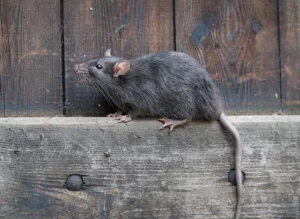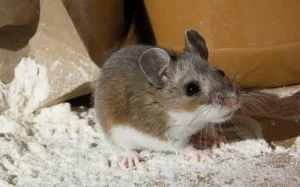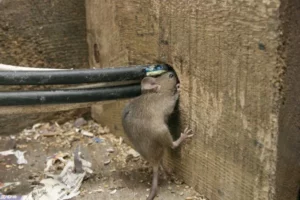
If you live in Dallas, Texas, there are several rodent species that could potentially invade your home. Identifying these common home-invading rodents is the first step in dealing with any potential infestation. In this article, we will discuss five rodent species that you should be aware of and how to prevent them from entering your home.
Norway rats, also known as brown rats or sewer rats, are one of the most common rodents found in the Dallas area. These rats have a stout body, blunt nose, and small ears. They are excellent climbers and burrowers, which means they can enter your home through small gaps and cracks.
Norway rats are omnivorous and will eat anything they can find. They can cause significant damage to your property by gnawing on wires, pipes, and insulation. If you notice droppings, chewed materials, or hear scratching noises in your home, you may have a Norway rat infestation.
When it comes to their nesting habits, Norway rats are known to create elaborate burrow systems. These burrows serve as their homes and provide them with protection from predators and the elements. The burrows can extend several feet underground and have multiple entrances and chambers. Inside these burrows, Norway rats create nests made of shredded materials such as paper, fabric, and vegetation.
Despite their name, Norway rats are not native to Norway. They are believed to have originated in Asia and spread to Europe and other parts of the world through trade routes. These rats are highly adaptable and have successfully established themselves in urban, suburban, and rural environments.

Roof rats, also known as black rats or ship rats, are agile climbers and excellent jumpers. They have slim bodies, pointed noses, and large ears. Unlike Norway rats, roof rats prefer to live in elevated areas such as trees, attics, and rafters.
These rats are skilled at finding entry points into homes, such as gaps in the roof, vents, or utility lines. Once inside, they can cause extensive damage to your attic and insulation. Roof rats are primarily nocturnal, so you may hear them scampering around at night.
Roof rats are known for their exceptional agility and acrobatic abilities. They can effortlessly navigate narrow ledges, tree branches, and power lines. Their long tails provide them with balance and stability as they move from one point to another. These rats are also excellent jumpers, capable of leaping several feet horizontally and vertically.
Despite their name, roof rats are not limited to roofs. They are highly adaptable and can be found in various habitats, including gardens, warehouses, and even inside vehicles. Their preference for elevated areas makes attics and rafters ideal nesting sites, providing them with shelter and protection.
House mice are one of the most common rodents worldwide and are frequently found in homes across Dallas. These small rodents have a slender body, pointed nose, and large ears. They can fit through tiny openings as small as a dime, making it easy for them to invade your home.
House mice are prolific breeders, and a single female can produce up to 35 offspring in a year. They are excellent climbers and can jump up to a foot in height. Mice can contaminate your food, spread disease, and cause structural damage by gnawing on wires and insulation.
When it comes to their nesting habits, house mice are opportunistic and will create nests in various locations within your home. Common nesting sites include wall voids, attics, basements, and even inside appliances. They construct their nests using soft materials like shredded paper, fabric, and insulation, providing a warm and cozy environment for their young.
House mice are known for their ability to squeeze through small openings due to their flexible bodies. They have a remarkable skeletal structure that allows them to compress their ribcage and squeeze through gaps that seem impossible for their size. This adaptability makes it challenging to keep them out of your home, as they can exploit even the tiniest cracks and holes.

Now that you know which rodent species to watch out for, it's crucial to understand how they can invade your home. Rodents are opportunistic creatures and can exploit even the tiniest openings to gain entry. Here are some common ways rodents can get into your home:
Preventing rodent entry starts with identifying and sealing these entry points. Regularly inspect your home for any gaps or cracks and seal them with caulk or steel wool. Install screens on vents and windows, and repair any damage to the walls promptly. It's also essential to keep your yard clean and remove any debris that could attract rodents.
When it comes to gaps and cracks in the foundation, rodents are masters at finding the tiniest openings. They can squeeze through holes as small as a quarter of an inch, making it crucial to thoroughly inspect your home's foundation for any potential entry points. Once they find a gap, they will gnaw and chew at it until it's large enough for them to squeeze through.
Unsealed vents and windows are another common entry point for rodents. These small openings can provide easy access for rodents, especially if they are not properly screened or sealed. Rodents can easily climb through open vents or squeeze through gaps in window frames, so it's important to ensure that all vents and windows are tightly sealed to prevent their entry.
Chewed holes in the walls are not only unsightly but also a clear sign of a rodent infestation. Rodents have strong teeth that continuously grow, so they constantly gnaw on various materials to keep their teeth in check. This gnawing behavior can result in chewed holes in walls, creating convenient entry points for rodents to access your home.
Openings around utility lines can also serve as entry points for rodents. These lines, such as electrical, plumbing, or cable lines, often have small gaps or openings where they enter your home. Rodents can exploit these gaps and use them as pathways to gain entry. It's important to seal any openings around utility lines to prevent rodent infiltration.
Uncapped chimneys can be an open invitation for rodents to enter your home. Chimneys without proper caps or screens can provide an easy access point for rodents to climb down and find shelter inside your home. Installing a chimney cap or screen can effectively prevent rodents from using your chimney as an entry point.
While identifying and sealing these entry points is crucial, it's also important to address the underlying factors that attract rodents to your home. Rodents are attracted to food, water, and shelter, so keeping your yard clean and free of debris is essential. Remove any potential food sources, such as fallen fruits or bird feeders, and ensure that garbage cans are tightly sealed. By eliminating these attractants, you can reduce the likelihood of rodents invading your home.
While rodent infestations are unpleasant, they also pose significant health and safety risks. Rodents can transmit diseases to humans through their droppings, urine, and saliva. Some common diseases associated with rodents include:
In addition to diseases, rodents can also cause property damage. Their constant gnawing can lead to electrical fires if they chew through wires. They can also damage insulation, which can cause energy inefficiency and increase your utility bills.
One of the most dangerous diseases transmitted by rodents is hantavirus. This viral infection is primarily spread through contact with rodent urine, droppings, or saliva. When these contaminated materials are disturbed, tiny particles can become airborne and easily inhaled by humans. Once inhaled, the virus can cause severe respiratory symptoms, including coughing, shortness of breath, and even potentially fatal respiratory distress.
Another disease associated with rodents is salmonella. This bacterial infection is commonly transmitted through contaminated food or water that has been exposed to rodent feces. Consuming food or water contaminated with salmonella can lead to symptoms such as diarrhea, fever, and abdominal cramps. In severe cases, it can even result in hospitalization and life-threatening complications.
Leptospirosis is yet another disease that can be transmitted by rodents. This bacterial infection is typically spread through contact with water, soil, or food contaminated with the urine of infected rodents. The symptoms of leptospirosis can vary from mild to severe and may include high fever, headache, muscle aches, vomiting, and jaundice. If left untreated, it can lead to organ damage and even death.
Rat-bite fever is a bacterial infection that can be transmitted to humans through bites or scratches from infected rodents. This disease can cause flu-like symptoms, including fever, chills, headache, muscle pain, and rash. If left untreated, rat-bite fever can lead to more serious complications, such as joint inflammation, heart infections, and even meningitis.
Aside from the health risks, rodent infestations can also cause significant damage to your property. Rodents have a constant need to gnaw on objects to keep their teeth from growing too long. Unfortunately, this means they often target electrical wires, which can lead to short circuits and potentially start electrical fires. The consequences of an electrical fire can be devastating, resulting in property damage, injuries, and even loss of life.
In addition to electrical damage, rodents can also wreak havoc on your home's insulation. They often use insulation materials for nesting, tearing it apart and creating holes and gaps in the process. This can compromise the energy efficiency of your home, as the insulation is no longer able to effectively regulate temperature and retain heat or cool air. As a result, your utility bills may increase as your heating and cooling systems have to work harder to maintain a comfortable indoor environment.
It is crucial to address rodent infestations promptly to protect your health and property. If you suspect a rodent problem, it is recommended to contact a professional pest control service to safely and effectively eliminate the infestation. Taking preventive measures, such as sealing any entry points and keeping your home clean and clutter-free, can also help reduce the risk of future infestations.

By following these strategies, you can significantly reduce the risk of a rodent infestation in your Dallas home. Regularly inspect your home for any potential entry points and seal them promptly. Keep your living spaces clean and free of food debris that may attract rodents.
While prevention is key, sometimes rodents do find a way into our homes. If you suspect an infestation, it's best to contact a professional pest control company. They have the knowledge and experience to handle rodent problems safely and effectively.
Remember, early detection and intervention are crucial to prevent rodents from multiplying and causing extensive damage. Don't let these unwelcome guests take over your Dallas home. Stay proactive and protect your family and property from rodent invasions.